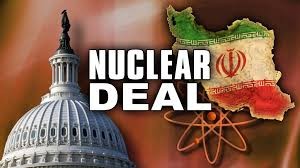There once was a time — it seems like an eon or two ago — when foreign policy decisions weren’t divided along party lines.
Those days are gone. Maybe they’ll be back. Eternal optimist that I am, I remain hopeful for a return of sanity in our federal government.
The Iran nuclear deal is the most glaring example I’ve seen of how partisanship now supersedes national unity in the face of threats from adversaries.
U.S. Sen. Jeff Merkley of Oregon, became the 31st Democrat to endorse the deal brokered by Secretary of State John Kerry and officials from five other great powers. Its aim is to prevent Iran from developing a nuclear weapon. Iran has insisted it intends only to provide energy for its people; of course, no one believes that.
Congressional Republicans appear united in their opposition to the deal. Democrats are mostly united in favor of it, although some have declared their intention to vote “no” when the issue comes up for a vote.
Merkley said something quite wise in announcing his support of the deal: “The future, whether we approve or reject the deal, is unknowable and carries risks. But the agreement offers us better prospects for preventing Iran from acquiring nuclear weapons and more tools and leverage to ensure that outcome.”
We cannot predict the future with absolute certainty, he said.
Is the deal perfect? No, but then again, when have we ever struck the perfect foreign policy agreement with anyone?
The agreement aims to derail whatever intentions the Iranians have of developing a nuclear bomb. It allows inspections of sites. It dismantles centrifuges. It allows the rest of the world to bring back strict economic sanctions if the Iranians are caught cheating on the deal.
None of that is enough to persuade Republicans to back it.
So, the world’s greatest military power is now showing to the world that its foreign policy team is being undercut by partisan political divides when it should be demonstrating an unflinching resolve to stand united against a rogue nation.
It’s turning instead into a numbers game, with Democrats seeking to pile up enough votes to filibuster Republican opposition to the deal while also gaining enough votes to sustain a certain presidential veto of any GOP rejection of the deal.
This is no way to conduct foreign policy.
